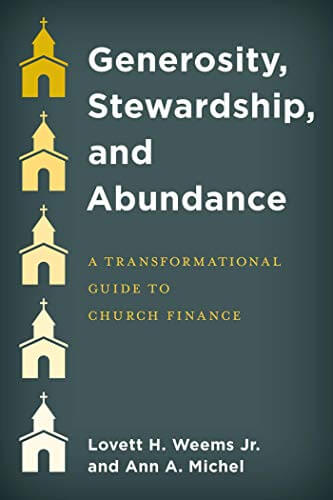Many churches dream of receiving a large gift or bequest, but few are prepared for the opportunities and challenges such a gift presents. Ken Sloane poses five simple questions to assess if your church is ready.
I hear someone out there saying, “Are you kidding?” Yet, I suspect that many churches are not ready for the opportunities and challenges that receiving a high-value donation might entail. Think about it. We’ve all seen or heard stories of churches that received large bequests without restrictions, and those bequests became the church’s downfall. Offerings declined because everyone believed “the bequest will take care of us.” Workdays at the church for cleaning and repairs stopped happening, because there was money from the bequest for building upkeep. Sunday school petered out because no one felt the need to volunteer anymore. The church turned inward, and that was its obituary.
Of course, that wouldn’t happen in your church, which may very well be true. A large gift can be a wonderful blessing to your church — if you’re ready for it.
Did you know that we are living through the largest transfer of wealth in history, as assets built over a lifetime are moving from one generation to the next? There are people in your community and in your church who have accumulated wealth and who will be deciding what will be the best use of that wealth when they are gone. They are doing their research to determine where their giving will reflect the values and priorities of their lives. Other people have investments made years ago that have grown in value, which, if sold, would create tax burdens. Those tax burdens could be turned into tax blessings if people donated them properly to support a worthy cause.
If you believe your church would be a good place for people to invest their assets and legacy gifts and if you think your church will be ready to receive them, then you should reflect on these five simple questions:
1. Does your church have a gift acceptance policy?
Janet and Phil Jamieson, authors of Ministry and Money: A Practical Guide for Pastors and Guidelines for Leading Your Congregation: Finance — Handling God’s Money in the Church, introduced churches to the idea of a gift acceptance policy: As a best practice, financially vital congregations establish and follow a gift acceptance policy. The financial leaders in these congregations are well aware of the risk connected with the acceptance of some non-cash gifts. Some gifts, they know, may be more costly to administer than the value of the gift. To protect against this risk, these churches establish policies and procedures related to acceptance of gifts.
What kind of risks should we be wary of when receiving non-cash gifts? Obviously, those that will be a drain on the resources of the church in money and time of staff and volunteers. Vacation time-share properties come to mind; any property that is in disrepair has liability concerns. Many items have value to donors but little to no value to the local church. One example is the Wurlitzer home organ console that is now obsolete due to the advent of digital keyboards.
Of even more concern are gifts that detract from your church’s values, mission, and vision. A gift designated for the purchase of heavy, ornate sanctuary furniture may not be appropriate for a congregation that values flexible and accessible worship space. Artwork that portrays a blond-haired, blue-eyed Jesus would be contrary to the values of a congregation hoping to grow a diverse membership.
Sometimes church leaders need to say no to a gift. Having a well-thought-out gift acceptance policy saves a lot of headaches and possible hurt feelings.
2. Do you have a mission and ministry dream list?
Imagine that someone from your church (or community) calls and says, “If I were to give you $100,000, what would you do for this church’s ministry?” As clergy leaders, do you have a visionary dream of how your church could take a giant step in ministry through a gift like this?
Professional fundraisers will tell you that the three factors most often mentioned in relation to someone’s decision to make a major gift to an organization are: (1) belief in the mission, (2) trust in the leader, and (3) transparency and accountability. In addition, donors want to hear that you have a vision to grow your mission beyond its present level. Many times, donors have their own ideas about how they would like their gifts used. Leaders who are able to articulate a vision for new ministry will convince them that there is energy and enthusiasm to make the finally determined ministry goal a reality!
3. Do you have some understanding of the different ways of giving?
Most pastors were not taught terms like “gift annuities” or “charitable remainder trusts” in seminary. Not every congregation has a tax attorney among the membership. So, who can help? Many denominations and judicatories have foundations set up to help local churches and their leaders better manage their financial assets. Typically, they can help with establishing an endowment, developing a planned giving program, and investment services.
4. Do you already have some funds that could start your endowment?
Many congregations have been receiving memorial gifts — amounts given in memory of those who have died. Maybe there is a building maintenance fund or funds identified for other needs. Funds like these could be brought together as part of the portfolio of an endowment fund. Individual stipulations for each of the funds can be maintained and respected but building a larger combined balance may open the door to a better return on investment.
There is another benefit to bringing smaller funds together into one, and that is visibility. Bring more attention to your endowment fund as a giving option and donors will find opportunities to make gifts. It’s an opportunity to promote how a gift can provide a scholarship to college or camp or to provide needed cash for the church food pantry. Simply by reporting on the progress of the fund you are reminding people that there is another way to give to the church beyond the regular offering.
5. Are you inviting people to include a legacy gift in their wills?
Are you ready to talk with people about the benefits of making a gift from their assets or about including a legacy gift for the church in their will? Lead by example. Do your own will and include a bequest to your church. Consider giving a tithe, 10 percent of your estate, to the church. Your example could have an enormous impact; it would be a witness to what is important in your life. Check out these brochures on planned giving, wills, and the power of legacy gifts.
This article was originally published through Discipleship Ministries. Used by permission.
Related Resources
- 6 Reasons Your Church Needs a Planned Giving Program by David Heetland
- 5 Reasons Not to Fear a Major Gift Campaign by Ann Michel







